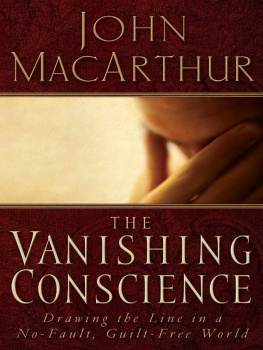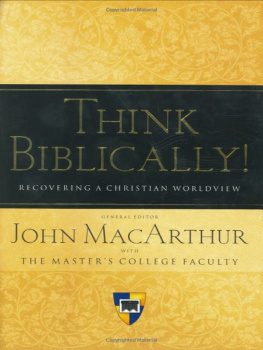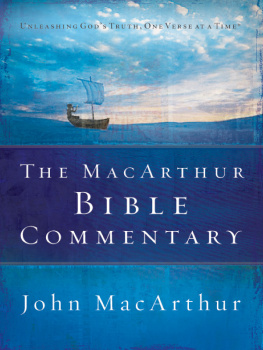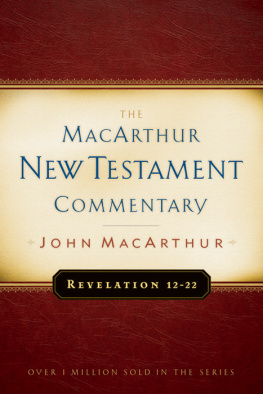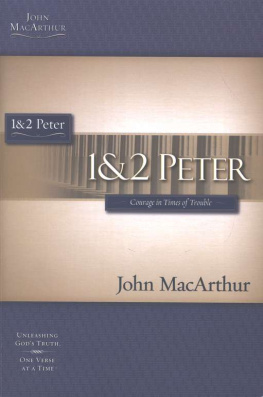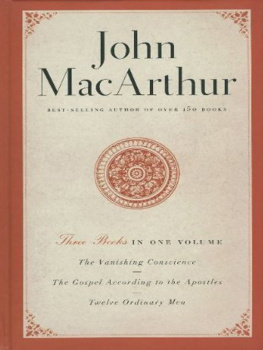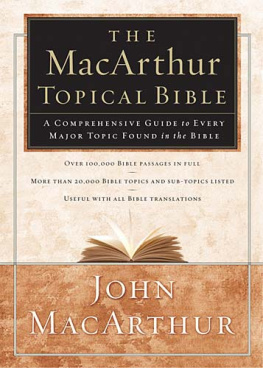John MacArthur - MacArthur 2in1 Vanishing Conscience & Hard to Believe
Here you can read online John MacArthur - MacArthur 2in1 Vanishing Conscience & Hard to Believe full text of the book (entire story) in english for free. Download pdf and epub, get meaning, cover and reviews about this ebook. year: 2009, publisher: Thomas Nelson, genre: Religion. Description of the work, (preface) as well as reviews are available. Best literature library LitArk.com created for fans of good reading and offers a wide selection of genres:
Romance novel
Science fiction
Adventure
Detective
Science
History
Home and family
Prose
Art
Politics
Computer
Non-fiction
Religion
Business
Children
Humor
Choose a favorite category and find really read worthwhile books. Enjoy immersion in the world of imagination, feel the emotions of the characters or learn something new for yourself, make an fascinating discovery.
- Book:MacArthur 2in1 Vanishing Conscience & Hard to Believe
- Author:
- Publisher:Thomas Nelson
- Genre:
- Year:2009
- Rating:4 / 5
- Favourites:Add to favourites
- Your mark:
- 80
- 1
- 2
- 3
- 4
- 5
MacArthur 2in1 Vanishing Conscience & Hard to Believe: summary, description and annotation
We offer to read an annotation, description, summary or preface (depends on what the author of the book "MacArthur 2in1 Vanishing Conscience & Hard to Believe" wrote himself). If you haven't found the necessary information about the book — write in the comments, we will try to find it.
Two books by John MacArthur in one volume. Contains the Vanishing Conscience and Hard to Believe.
MacArthur 2in1 Vanishing Conscience & Hard to Believe — read online for free the complete book (whole text) full work
Below is the text of the book, divided by pages. System saving the place of the last page read, allows you to conveniently read the book "MacArthur 2in1 Vanishing Conscience & Hard to Believe" online for free, without having to search again every time where you left off. Put a bookmark, and you can go to the page where you finished reading at any time.
Font size:
Interval:
Bookmark:
THE
VANISHING
CONSCIENCE
HARD TO
BELIEVE
THE HIGH COST AND INFINITE VALUE
OF FOLLOWING JESUS
JOHN MACARTHUR

The Vanishing Conscience ? by John MacArthur
All rights reserved. No portion of this book may be reproduced, stored in a retrieval system, or transmitted in any form or by any meanselectronic, mechanical, photocopy, recording, scanning, or otherexcept for brief quotations in critical reviews or articles, without the prior written permission of the publisher.
Published in Nashville, Tennessee, by Thomas Nelson. Thomas Nelson is a registered trademark of Thomas Nelson, Inc.
Thomas Nelson, Inc., titles may be purchased in bulk for educational, business, fund-raising, or sales promotional use. For information, please e-mail SpecialMarkets@ThomasNelson.com.
All Scripture quotations in this book, except those noted otherwise, are from the New American Standard Bible, 1960, 1962, 1963, 1968, 1971, 1972, 1973, 1975, and 1977 by The Lockman Foundation, and are used by permission.
Quotations marked KJV are from the King James Version.
Appendixes 2 and 3 are selected from an unpublished collection of Puritan and Reformed essays adapted for modern readers, 1994 by Phil Johnson. Used by permission.
Hard to Believe 2003 by John MacArthur
All rights reserved. No portion of this book may be reproduced, stored in a retrieval system, or transmitted in any form or by any meanselectronic, mechanical, photo-copy, recording, scanning, or otherexcept for brief quotations in critical reviews or articles, without the prior written permission of the publisher.
Published in Nashville, Tennessee, by Thomas Nelson. Thomas Nelson is a registered trademark of Thomas Nelson, Inc.
Published in association with the literary agency of Wolgemuth & Associates, Inc.
Thomas Nelson, Inc., titles may be purchased in bulk for educational, business, fund-raising, or sales promotional use. For information, please e-mail SpecialMarkets@ThomasNelson.com.
Unless otherwise noted, Scripture quotations are from THE NEW KING JAMES VERSION.
1979, 1980, 1982, Thomas Nelson, Inc., Publishers.
Scriptures noted KJV are from THE KING JAMES VERSION.
ISBN 978-1-4002-8084-1
Printed in the United States of America
09 10 11 12 LB 6 5 4 3 2 1
THE
VANISHING
CONSCIENCE
To Al Sanders
with gratitude for half a century
of loyal service to the Savior
and thanks for many years
as a wise and generous friend.
Contents
We live in a culture that has elevated pride to the status of a virtue. Self-esteem, positive feelings, and personal dignity are what our society encourages people to seek. At the same time, moral responsibility is being replaced by victimism, which teaches people to blame someone else for their personal failures and iniquities. Frankly, the biblical teachings about human depravity, sin, guilt, repentance, and humility are not compatible with any of those ideas.
The church has been far too willing to embrace the fads of worldly opinionparticularly in the area of psychology and self-esteem. Christians often merely echo worldly thinking on the psychology of guilt and the importance of feeling good about oneself. The adverse effect on the life of the church can hardly be underestimated.
Nowhere has the damage registered more than in the way professing Christians deal with their own sin. In speaking to Christians around the country, I have seen a disheartening trend developing for at least two decades. The church as a whole is growing less concerned with sin, and more obsessed with self-exoneration and self-esteem. Christians are rapidly losing sight of sin as the root of all human woes. And many Christians are explicitly denying that their own sin can be the cause of their personal anguish. More and more are attempting to explain the human dilemma in wholly unbiblical terms: temperament, addiction, dysfunctional families, the child within, codependency, and a host of other irresponsible escape mechanisms promoted by secular psychology.
The potential impact of such a drift is frightening. Remove the reality of sin, and you take away the possibility of repentance. Abolish the doctrine of human depravity and you void the divine plan of salvation. Erase the notion of personal guilt and you eliminate the need for a Savior. Obliterate the human conscience, and you will raise an amoral and unredeemable generation. The church cannot join hands with the world in such a grossly satanic enterprise. To do so is to overthrow the very gospel we are called to proclaim.
This book is not merely a lament about societys deplorable moral state or the damage we see caused by sin all around us. Nor is it an attempt to stir Christians up to tackle the impossible task of reconstructing society. Awakening the church to the awful reality of sin is my only point of concern. That alone would have a positive effect on the world.
Is social reconstruction even an appropriate way for Christians to spend their energies? I recently mentioned to a friend that I was working on a book dealing with sin and our cultures declining moral climate. He immediately said, Be sure you urge Christians to get actively involved in reclaiming society. The main problem is that Christians havent acquired enough influence in politics, art, and the entertainment industry to turn things around for good. That, I acknowledge, is a common view held by many Christians. But Im afraid I dont agree. The weakness of the church is not that were too uninvolved in the politics or administration of our society, but that we too easily absorb the false values of an unbelieving world. The problem is not too little activism, but too much assimilation. As I noted in a recent book, the church is fast becoming like the world in several respects. Those most active in the social and political realms are often the first to absorb the worlds values. Social and political activists cannot have any worthwhile impact on society if their own consciences are not clear and strong.
Reclaiming the culture is a pointless, futile exercise. I am convinced we are living in a post-Christian societya civilization that exists under Gods judgment. As we will note in an early chapter of this book, abundant evidence suggests that God has abandoned this culture to its own depravity. Certainly He is not interested in superficial moral reform for an unregenerate society. Gods purpose in this worldand the churchs only legitimate commissionis the proclamation of the message of sin and salvation to individuals, whom God sovereignly redeems and calls out of the world. Gods purpose is to save those who will repent of their sins and believe the gospelnot to work for external corrections in a morally bankrupt culture.
If that sounds the least bit pessimistic or cynical to you, it isnt. Scripture predicted times exactly like these:
In the last days difficult times will come. For men will be lovers of self, lovers of money, boastful, arrogant, revilers, disobe- dient to parents, ungrateful, unholy, unloving, irreconcilable, malicious gossips, without self-control, brutal, haters of good, treacherous, reckless, conceited, lovers of pleasure rather than lovers of God; holding to a form of godliness, although they have denied its power.... [And] evil men and impostors will proceed from bad to worse, deceiving and being deceived (2 Tim. 3:15, 13).
Gods purposes are being fulfilled, no matter how vainly people strive against Him. Titus 2:11 assures us that Gods grace appears, bringing salvation in the midst of the lowest human depravity, teaching us to live sensibly, righteously and godly in the present age (v. 12).
Next pageFont size:
Interval:
Bookmark:
Similar books «MacArthur 2in1 Vanishing Conscience & Hard to Believe»
Look at similar books to MacArthur 2in1 Vanishing Conscience & Hard to Believe. We have selected literature similar in name and meaning in the hope of providing readers with more options to find new, interesting, not yet read works.
Discussion, reviews of the book MacArthur 2in1 Vanishing Conscience & Hard to Believe and just readers' own opinions. Leave your comments, write what you think about the work, its meaning or the main characters. Specify what exactly you liked and what you didn't like, and why you think so.

